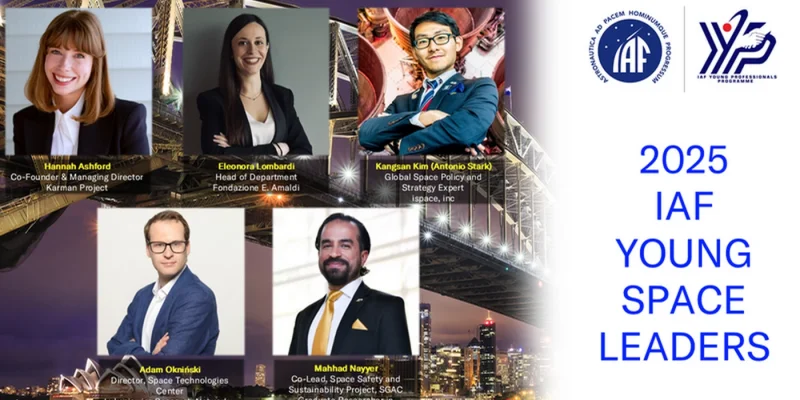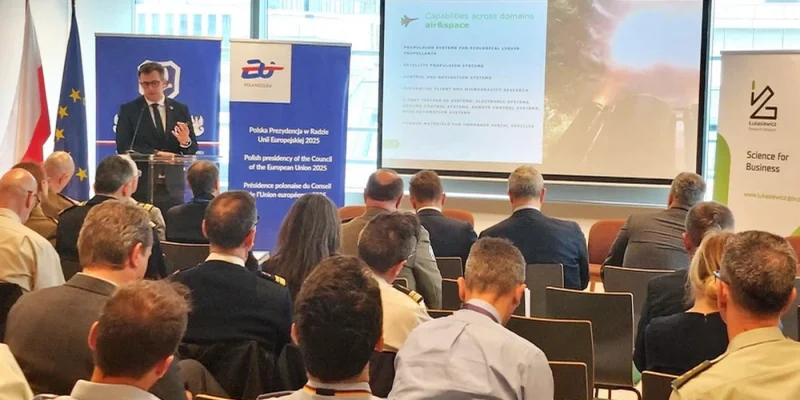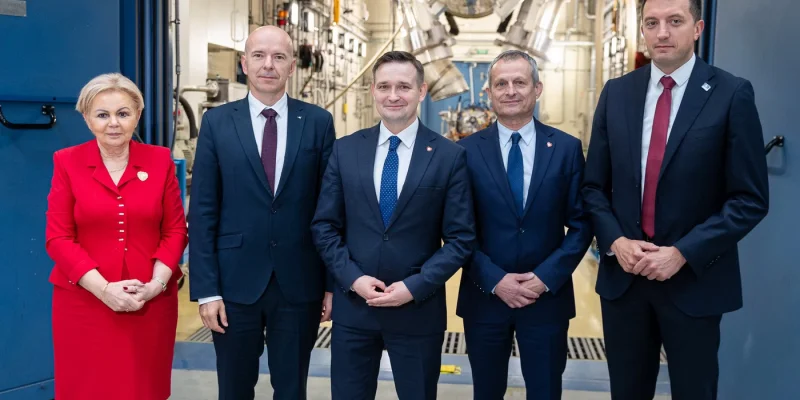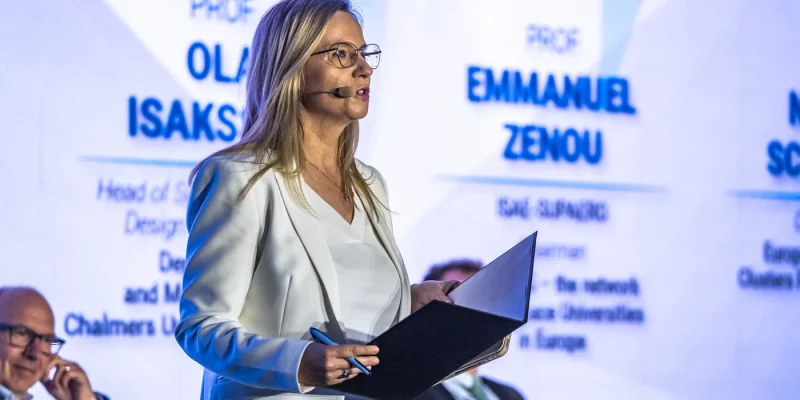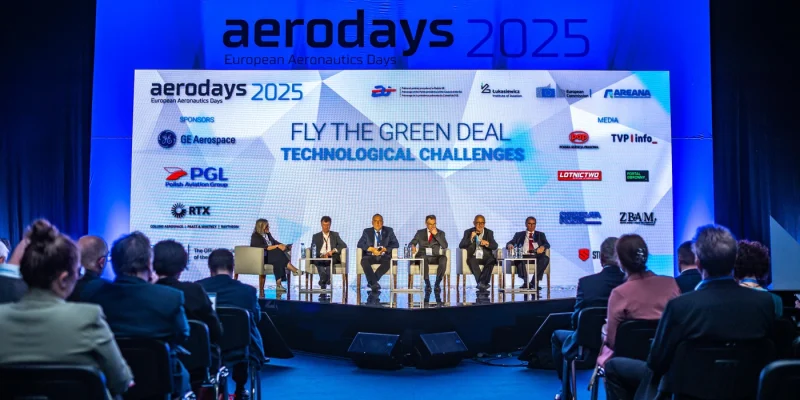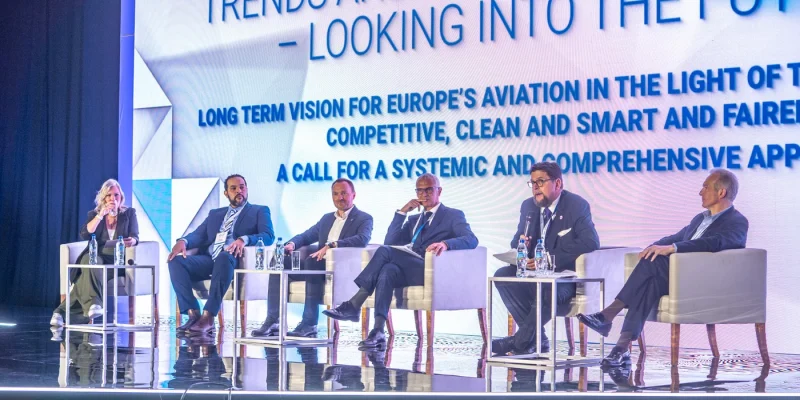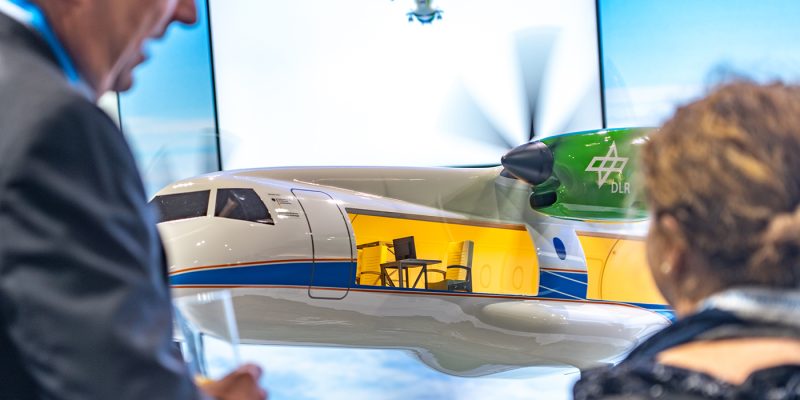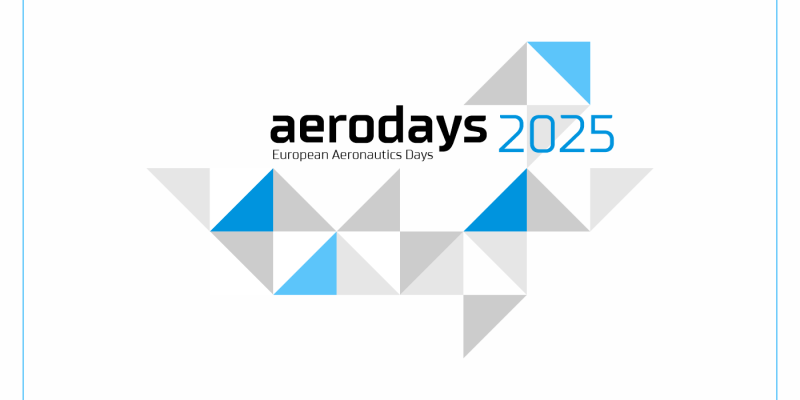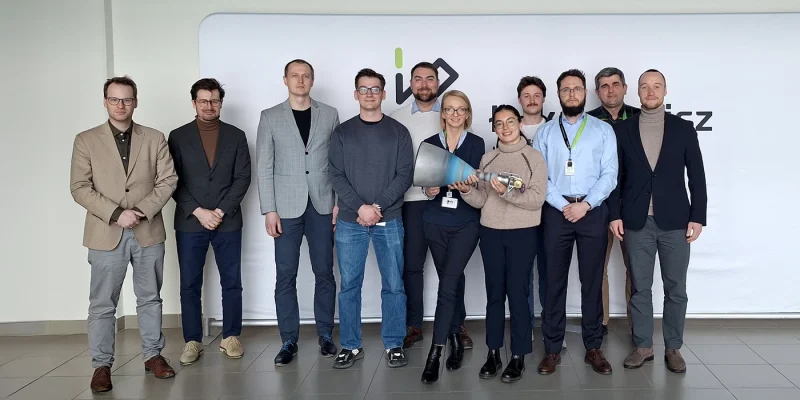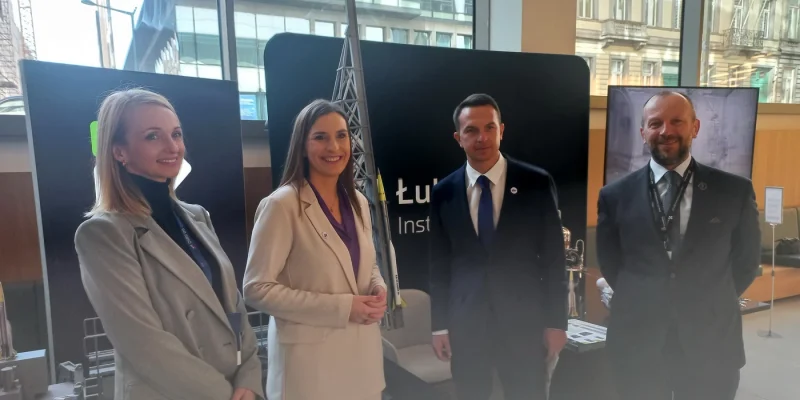March 4th is World Engineering Day, celebrated under the slogan “Engineering solutions for a sustainable world”. The Łukasiewicz – Institute of Aviation employs over 1000 engineers creating breakthrough technologies that are consistent with the sustainable development goals. On a daily basis, they cooperate with world-class suppliers of the latest technological solutions, including GE Aerospace, GE Vernova, Baker Hughes, Wabtec, Boeing, Middle River Aerostructure Systems. Which of the solutions developed by the Institute’s engineers are used in the areas of aviation, space, energy and industry?
World Engineering Day for Sustainable Development is an excellent opportunity to look at the achievements of engineers working at the Łukasiewicz – Institute of Aviation. Interestingly, although their achievements may be associated with the aviation industry, including unmanned aerial vehicles (UAVs) and space, they are used in sectors such as energy, the mining and automotive industry.
Development of environmentally friendly aviation
Moving away from harmful fuels in favor of natural methods of energy production is a topic that is on the minds of engineers not only in the automotive industry but also in the aviation industry.
– Łukasiewicz – Institute of Aviation carry out research on emissions of pollutants (COx, NOx) and noise by aircraft engines in order to minimize their negative impact on the environment. At the same time, a team of engineers carries out projects in the development of hybrid drive systems. The Institute also conducts research on the use of hydrogen as an alternative fuel in aviation. Implementation of innovative projects by an experienced team is a great opportunity to develop an engineering career for those who are currently studying or thinking about choosing a field of study – explains Dr. Eng. Sylwester Wyka, deputy director for research at the Łukasiewicz – Institute of Aviation.
What projects do engineers from Łukasiewicz – Institute of Aviation work on? The team implements for example HERFUSE project, the aim of which is to develop a prototype of an innovative fuselage for a hybrid-electric passenger aircraft. The success of this project will have a positive impact on the goal of reducing greenhouse gas emissions. However, changing the propulsion concept and using hybrid/electric technologies will require the development of a completely new airframe structure. The project coordinated by the Italian company Leonardo will focus on the challenges of optimizing the hull structure, using new materials, and innovative production and assembly technologies.
The development of unmanned aviation is an opportunity for sustainable transport
Unmanned aerial vehicles or drones, may revolutionize the transport in the future and significantly reduce pollution generated mainly by road transport. Engineers from the Łukasiewicz – Institute of Aviation are working on further patents for solutions that may contribute to this.
– Unmanned aerial vehicles can be an alternative to commonly used forms of transport. That is why our engineers are working on a number of solutions that will have both military and civilian applications. An example of such technology is the MSL (Microwave Landing System) enabling a precise and safe approach to landing. This solution will work well both during an emergency landing and as a mobile precision approach system capable of achieving operational capability in a very short time and at any height above the terrain. The solution is autonomous and independent of the GPS signal. The automatic calibration system used in it ensures correct operation in various topographic conditions – says Dr. Eng. Bartosz Dziugieł from the Center for Aviation Technologies at Łukasiewicz – Institute of Aviation.
Another application developed by engineers from the Łukasiewicz – Institute of Aviation is the use of a swarm of drones for dynamically optimized management of the movement of a set of independent, autonomous objects.
– The system would support the evacuation of people and animals from endangered areas. The invention may also have wider applications, e.g. in road traffic, in the case of large groups of people, during mass events where there is a risk of events hazardous to life and health – continues Dr. Eng. Bartosz Dziugieł.
Green propellants
The solutions the Institute is working on also reach into space. These include: ecological fuels and oxidizers for satellites, landers and space rockets. Rocket engines need enormous power to operate. The propellant based on high concentration hydrogen peroxide (above 98%), the method of which was developed at the Łukasiewicz Institute of Aviation, is friendly to people and the environment, and at the same time shows exceptional performance in engines. It has become an alternative to the previously used hydrazine which is highly harmful to the environment.
– The Institute has also developed many designs of various types of engines and propulsion modules based on an ecological oxidant. The Institute’s employees develop their research potential in the Rocket and Satellite Propulsion Laboratory Center, unique on a European and global scale – says Dr. Eng. Adam Okniński, director of the Center for Space Technologies at Łukasiewicz – Institute of Aviation.
Not only space and aviation
The technologies developed by the Institute’s engineers are also used in industries beyond aviation and space. An example is the use of thermoformed composite materials to produce elements that absorb impact energy.
– The impact energy absorption technology was developed as part of the project: “Design of a frontal collision energy absorber for a passenger vehicle (CRASH-BOX)” implemented by the Łukasiewicz Research Network as part of the consortium of Łukasiewicz – Institute of Aviation and Łukasiewicz – Industrial Automotive Institute. The use of this technology, e.g. in airplane or passenger car seats, translates into increased protection of passengers during an emergency landing or impact as a result of a road accident. It is also an element of sustainable production, because thermoplastic composites can be processed into other products by melting – says Dr. Eng. Bartłomiej Waśniewski, head of the Department of Thermoplastic Composites Technology and Structural Analysis at the Łukasiewicz – Institute of Aviation.
Recycling and strategic materials management
According to UN estimates, by 2050 the global consumption of materials such as biomass, fossil fuels, metals and minerals may double, and the amount of waste generated annually may increase by 70%. Engineers at the Łukasiewicz – Institute of Aviation design solutions that will allow raw materials to remain in the economy for as long as possible to limit the production of waste.
– One of the opportunities for sustainable production is the use of processed material in 3D printing. The integrated design and manufacturing process used at the Institute allows for the development of a comprehensive ecosystem for many industries. The benefits of this solution include reducing the costs of raw materials, reducing energy consumption and reducing the amount of waste. It is worth mentioning that today we are technologically ready to 3D print in polymer materials, such as elastomers, composites, ABS, as well as in metal, including copper, says Jacek Walasik, head of the Department of Modern Manufacturing Technologies at the Łukasiewicz – Institute of Aviation.
Engineering staff with international competences
The engineers who are the authors of these breakthrough solutions include: designers, analysts, mechanics, reliability analysts, electricians, automation engineers, quality and test service engineers. Many of the current employees of the Łukasiewicz – Institute of Aviation began their professional career at the Institute while still studying as junior engineers, and while gaining knowledge and experience, they were promoted to managerial positions.
– In 2023, engineers from the Łukasiewicz Institute of Aviation repeatedly visited factories and production sites of engines and aircraft parts of our strategic clients, such as GE Aerospace and Middle River Aerostructure Systems. Close cooperation with production departments allows engineers to compare the results of their research and tests with real effects. Such cooperation is also an opening to combining professional and research careers, especially in the case of implementation doctorates. Thanks to these activities, we can, together with the business world, optimize the emerging solutions also in terms of their impact on the natural environment and our climate – says Artur Rudnik, director of the Engineering Design Center at the Łukasiewicz – Institute of Aviation.
Among engineers, the Łukasiewicz – Institute of Aviation is described as a springboard to success. New recruitments are carried out here every year related to the development of the organization and new clients, including such recognized technology companies as GE Aerospace, GE Vernova, Baker Hughes, Wabtec, Boeing and Middle River Aerostructure Systems.
_
The Łukasiewicz Research Network – Institute of Aviation is one of the most modern research facilities in Europe, with traditions dating back to 1926. The Institute closely cooperates with global tycoons of the aviation industry, such as: Boeing, GE, Airbus, Pratt & Whitney, and institutions from the space industry, including the European Space Agency. Strategic research areas of the Institute are aviation, space and unmanned technologies. It also provides research and services for domestic and foreign industries in the field of materials, composite, additive, remote sensing, energy and oil&gas technologies. More: ilot.lukasiewicz.gov.pl/en/
The Łukasiewicz Research Network offers businesses attractive, broad and competitive technological solutions. Łukasiewicz provides a unique “challenge system” powered by a group of 4,500 scientists, who take up a business challenge and present the entrepreneur with potential solutions. At the same time, it provides access to cutting-edge capabilities and unique scientific infrastructure in the country. Most importantly – the entrepreneur does not bear the cost of preparing the conception of the research works. Łukasiewicz conveniently meets the expectations of the business. The entrepreneur can contact Łukasiewicz through an online form on our website https://lukasiewicz.gov.pl/en/business/ but also directly in over 50 locations of Łukasiewicz Institutes and their branches throughout Poland. Each site provides the same, high quality, product or service. Łukasiewicz focused on research areas such as: Health, Smart and Clean Mobility, Digital Transformation and Green and Low-emission Economy.



